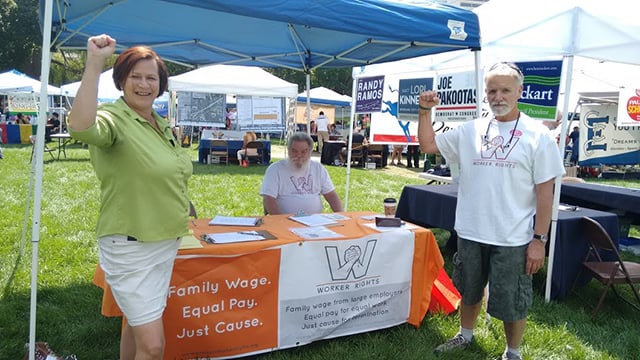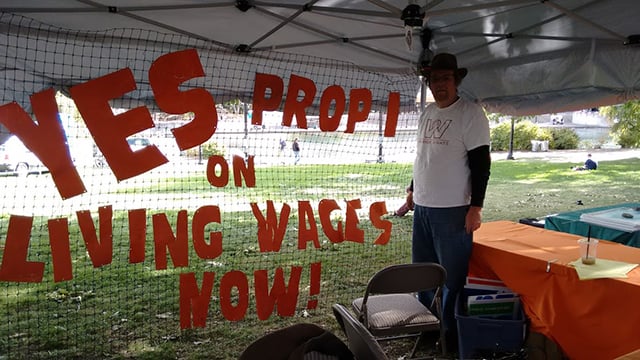
Seattle, San Francisco and Los Angeles have become the local-level vanguard in the fight for a $15-an-hour minimum wage, and New York Gov. Andrew Cuomo recently announced that he would be introducing legislation for a statewide $15-an-hour minimum wage ordinance, as well. Fourteen states have changed their minimum wage law since January 2014, though not all of them have approved minimums as high as $15. And apparently, it is a trend that transcends party lines for voters.
If last fall’s midterm elections proved anything (other than that the Democratic Party has adopted flawed campaign strategies), it is that progressive minimum wage initiatives can win majorities, sometimes in landslides, in GOP-dominated states like Alaska, Arkansas, Nebraska and South Dakota. This is perhaps unsurprising. As Rachel Cohen reported for The American Prospect in the elections’ aftermath, “63 percent of voters believe the U.S. economic system favors the rich; this highlights a much larger national frustration for politicians to organize around.”
On November 3, 2015, voters in Spokane, Washington, will decide whether or not they are willing to act on their collective frustration by enacting what community activists have termed a “Worker Bill of Rights” via a ballot initiative called Proposition 1. The initiative seeks to secure the “right to a family wage when employed by a large employer,” as well as the right to equal pay for equal work and the right not to be wrongfully terminated. The proposed initiative also “elevates [city] Charter rights above rights claimed by corporations.”
Shifting Power in Spokane
Since 2009, Kai Huschke has been working at the Community Environmental Legal Defense Fund as a member of the Envision Spokane coalition of local activists behind the campaign to place community rights over corporate rights in Spokane.
“The reality is we don’t decide what happens in our very own communities,” Huschke told Truthout. “We have a system today that actually puts us in the hands of corporations.”
The initiative, at its core, is about power, Huschke added. “It’s about actually shifting power away from those who currently hold it and do much damage, and back into the people’s hands.”
“It’s about shifting power away from those who currently hold it and do much damage, and back into the people’s hands.”
The family wage portion of Proposition 1 is the first time anyone anywhere in the United States will be voting on such a provision. The Envision Spokane coalition’s plan is for the family wage to be based on the amount needed to meet the basic needs of a two-person household, specifically a single parent with one child: an annual total of $45,797, according to the Economic Policy Institute. This should actually come out to a dollar figure much higher than $15 an hour. Proposition 1 stipulates that the family wage be imposed on establishments with over 150 full-time employees. While this would only affect approximately 1 percent of all Spokane establishments, it would definitely impact the city’s hospitals, casino, nearby energy corporations and Walmart.
Supporters of the initiative are fighting for the right to equal pay for equal time at a time when local studies report that “a woman who has worked full time, year-round in the last 12 months will make (on average) $9,124 less than men with similar work experience per year in the City of Spokane.” Meanwhile, the right not to be wrongfully terminated is based on ending protections that enable employers to fire workers for any reason they see fit.
If passed, these progressive policies would constitute a sharp departure from our nation’s constitutional protection of private, moneyed interests. Perhaps the most radical portion of the proposed law is its controversial guarantee that community decision-making supersedes the right of any corporation.
“It’s an old tension,” said Michael McCann, director of the Harry Bridges Center for Labor Studies at the University of Washington, describing the tension between corporate power and democratic power.
McCann told Truthout that at the heart of the initiative is this question: “At what point does business become something more than just a private entity that in fact owes a larger amount of public accountability and regulatory authority, counterbalancing the interests of citizens, communities and workers?”
“What we’ve seen in the last decade is continued unregulated, unburdened power of big business,” which constitutes “a source of general hardship for people as workers, for people as consumers, for people as members of the community,” he added.
The community rights supersession clause of the initiative would enable voters to beat back legal challenges on any democratically based policy measure. For example, it would stop the types of challenges that Envision Spokane has endured since first attempting to get a similar proposal on the ballot in 2009.
Past Efforts to Pass a Local Bill of Rights
 Volunteer Chris Nerisen sets up the Worker Bill of Rights campaign booth at a local event in Spokane, Washington. (Photo: Envision Spokane)
Volunteer Chris Nerisen sets up the Worker Bill of Rights campaign booth at a local event in Spokane, Washington. (Photo: Envision Spokane)
November 2015 will mark the third time that activists in Spokane have tried to put an initiative for a local bill of rights on the ballot. Court challenges to such efforts have been rampant: Opponents tried to use the courts to keep the initiative off the ballot in 2009 and 2011, when Envision Spokane attempted to pass what was then called the Community Bill of Rights, a largely environmentally focused proposition that only shares the community rights portion in common with the Worker Bill of Rights.
The first try ended in a huge defeat for initiative advocates, with 80 percent of the electorate voting no. Huschke said the defeat can be traced to decisions made by Spokane City Council members to attach so-called “advisory questions” to the ballot that year – meaning that voters were asked whether or not they’d be willing to have taxes raised or services cut in order to meet the initiative’s aims.
Two years later, City Council members voted 4-3 to keep those same questions off the 2011 ballot. That time, Envision Spokane came nail-bitingly close to victory with a 51-49 percent loss, only 1,000 votes away from succeeding.
After courts derailed a 2013 try on grounds of statute overreach, the 2015 version was revamped, featuring worker-centric policy proposals alongside Envision’s traditional assertion that community rights should trump those belonging to corporations. While Envision failed to persuade Council members to drop their attempts to include advisory questions on the ballot, proposition advocates could still seemingly electorally benefit from the rolling tide of minimum wage legislation that has proliferated in the years since Envision’s last attempt.
As Mark Weisbrot, codirector of the Center for Economic and Policy Research, wrote for US News & World Report in January 2014, “A combination of grassroots action by activists and organized workers, as well as public education, changed public consciousness to the point where politicians and their pollsters recognize that there is political profit to be made by raising the minimum wage.” Envision has surely made enough attempts to mobilize, educate and organize as a part of this popular fervor.
Envisioning the World in Which We Want to Live
Reflecting on the campaign in Spokane, Huschke told Truthout, “The question we normally ask ourselves is ‘what can we get?'” In other words, he said, we look at “how the legal structure works, or how things function, [and] we’re left with what can we get. All of our activism typically functions within that realm … but the question here is: ‘What do we want?'”
It seems that asking “what do we want” is a good place to start for plenty of other activists around the country who live in cities where state governments have passed laws banning localities from raising the minimum wage above the state’s level, what is called state preemption. A report published by Pew in January 2015 notes that 15 different states have enacted preemption, with half coming in the past five years. Much of the push made in state legislatures has been carried out by the American Legislative Exchange Council, the notorious corporate-funded lobbying organization otherwise known as ALEC, which in essence is the reason why Seattle can get a $15-an-hour minimum wage but Oklahoma City or Denver cannot.
Cliff Willmeng, an organizer in Colorado, told Truthout that in his state “a local community cannot create a minimum wage higher than the state’s minimum wage. A local community can not create rent control, that is also preempted.”
In other words, the government uses preemption to prevent democratic decision-making, added Willmeng, an organizer with the campaign for a Colorado Community Rights amendment, an effort to codify the rights of communities, through a democratic process, regardless of preemption.
“These local initiatives are classic attempts to provide some democratic balance.”
“The Colorado Community Rights amendment addresses the idea that state preemption is a violation of the right to democratic local government,” Willmeng said. If Willmeng’s initiative proves successful in Colorado, where organizers are gathering signatures to qualify for the 2016 November elections, the victory could get the ball rolling for further minimum wage hikes and perhaps even more family wage attempts in the other 15 states where preemption applies.
If anything, “what do we want” could also be a continuation of the long-forgotten dream for national economic prosperity laid out by President Franklin D. Roosevelt in his State of the Union speech in 1944, when he said, “We cannot be content, no matter how high that general standard of living may be, if some fraction of our people – whether it be one-third or one-fifth or one-tenth – is ill-fed, ill-clothed, ill-housed, and insecure.” Roosevelt died before he could campaign to encode the right to full employment and a living wage into law through his “economic bill of rights” initiative.
Due to the corporate-funded power of groups like ALEC, state governments are becoming more and more hostile to democratically enabled labor power, while the federal government remains mired in gridlock. Nevertheless, resistance movements are arising and they are succeeding. The domestic worker bills of rights passed in New York and California, as well as a bill of rights for retail workers in San Francisco, are broadening the protections afforded to typically unorganized workers. And community-driven campaigns like the one in Spokane have the potential to sweep aside otherwise typically successful corporate challenges of democratic measures.
“These local initiatives are classic attempts to provide some democratic balance,” McCann told Truthout, adding that, if passed, they could “rein in some of the greatest harms and injustices that business often imposes on communities.”
Defying Trump’s right-wing agenda from Day One
Inauguration Day is here, and at Truthout, we plan to defy Trump’s right-wing agenda from Day One.
Looking to the first year of Trump’s presidency, we know that the most vulnerable among us will be harmed. Militarized policing in U.S. cities and at the borders will intensify. The climate crisis will deteriorate further. The erosion of free speech has already begun, and we anticipate more attacks on journalism.
It will be a terrifying four years to produce social justice-driven journalism. But we’re not falling to despair, because we know there are reasons to believe in our collective power.
The stories we publish at Truthout are part of the antidote to creeping authoritarianism. And this year, we promise we will kick into an even higher gear to give you truthful news that cuts against the disinformation, vitriol, hate and violence. We promise to publish analyses that will serve the needs of the movements we all rely on to survive the next four years, and even build for the future. We promise to be responsive, to recognize you as members of our community with a vital stake and voice in this work.
Please show your support for Truthout with a tax-deductible donation (either once today or on a monthly basis).